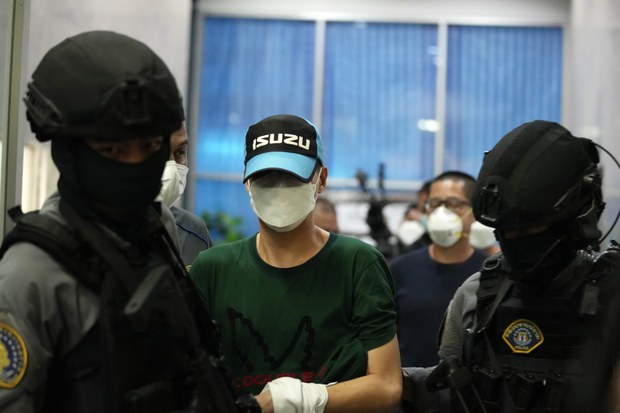Thai police to enforce court ruling to immediately implement anti-torture law
2023.05.19
Bangkok
 Thai police escort Thitisan Utthanaphon, a former policeman known as “Jo Ferrari,” while leaving the Crime Suppression Division in Bangkok, Aug. 26, 2021.
Thai police escort Thitisan Utthanaphon, a former policeman known as “Jo Ferrari,” while leaving the Crime Suppression Division in Bangkok, Aug. 26, 2021.
Thailand’s national police on Friday said it would implement a court order this week to immediately implement an anti-torture law that requires officers to videotape interrogations of suspects in custody.
Maj. Gen. Achayon Kraithong, the Royal Thai Police spokesman, said officers would accelerate the process to enforce the law.
“There should be no problems complying with the enacted law,” he told BenarNews.
“We already have a number of cameras in place, and from now on, procurement for more will begin,” he said. “Meanwhile, if there is an emergency, the police chief has directed officers to utilize existing cameras.”
The Prevention and Suppression of Torture and Enforced Disappearance Act was to take effect in February, but the government had delayed its enforcement citing a police request for more time to procure enough video recording equipment.
On Thursday, the Thai Constitutional Court ruled 8 to 1 that the cabinet’s decision to postpone enforcement had violated the Constitution and ordered that terms of the act, including videotaping of suspects in custody and interrogations, must begin at once.
Lawmakers had passed the Prevention and Suppression of Torture and Enforced Disappearance Act on Aug. 24, 2022, and announced it in the Royal Gazette on Oct. 25, 2022, to take effect in 120 days (Feb. 22). The new law requires police and military personnel to videotape and record interrogations of suspects in custody.
The act defines what torture, enforced disappearance and victims constitute. It declares that direct commanders could be held criminally liable. It also does not allow secret detention and protects from retaliation those who file complaints.
Two months before that act was passed, six police officers were sentenced to life in prison for the in-custody death of a drug suspect. The interrogation – in which the suspect was handcuffed with plastic bags over his head – was caught on video in 2021 and released on social media.
The officers included former police Col. Thitisan Utthanaphon, nicknamed “Jo Ferrari,” because he owned a fleet of expensive cars.
Meanwhile, a court in Songkhla province in the Deep South ruled in May 2022 there was no evidence to show that a suspected insurgent who fell into a coma and died after the Thai military arrested him was tortured during interrogation.
The ruling ended a two-year inquest into 34-year-old Abdullah Esomuso’s 2019 death and dashed his family’s hopes that military personnel might be charged for it.
Activists react
Angkhana Neelaphaijit, former national human rights commissioner, said she appreciated the court ruling as she had fought for the law’s passage.
“I am pleased because we have been waiting for a long time, and we want to see enforcement by the relevant authorities, including Thai police, DSI and prosecutors,” she told BenarNews using an acronym for the Department of Special Investigation.
“We want to see people who have been affected by enforced disappearances and torture receive justice. We would like to see non-refoulement, which means not forcibly repatriating individuals to their countries if it would expose them to danger,” she said.
“The government should demonstrate responsibility for proposing laws that conflict with the Constitution.”
Pornpen Kongkajornkiat, director of the Cross Cultural Foundation, a Thai NGO, praised the decision.
“The court’s ruling today is legitimate. It demonstrates respect for the people’s fundamental rights as well as respect for the parliamentary system,” she told BenarNews.
“What the new government should do from now on is uphold the law and give remedies for people who have been affected by previous state officials’ misconduct.”
Wilawan Watcharasakwej in Bangkok contributed to this report.







